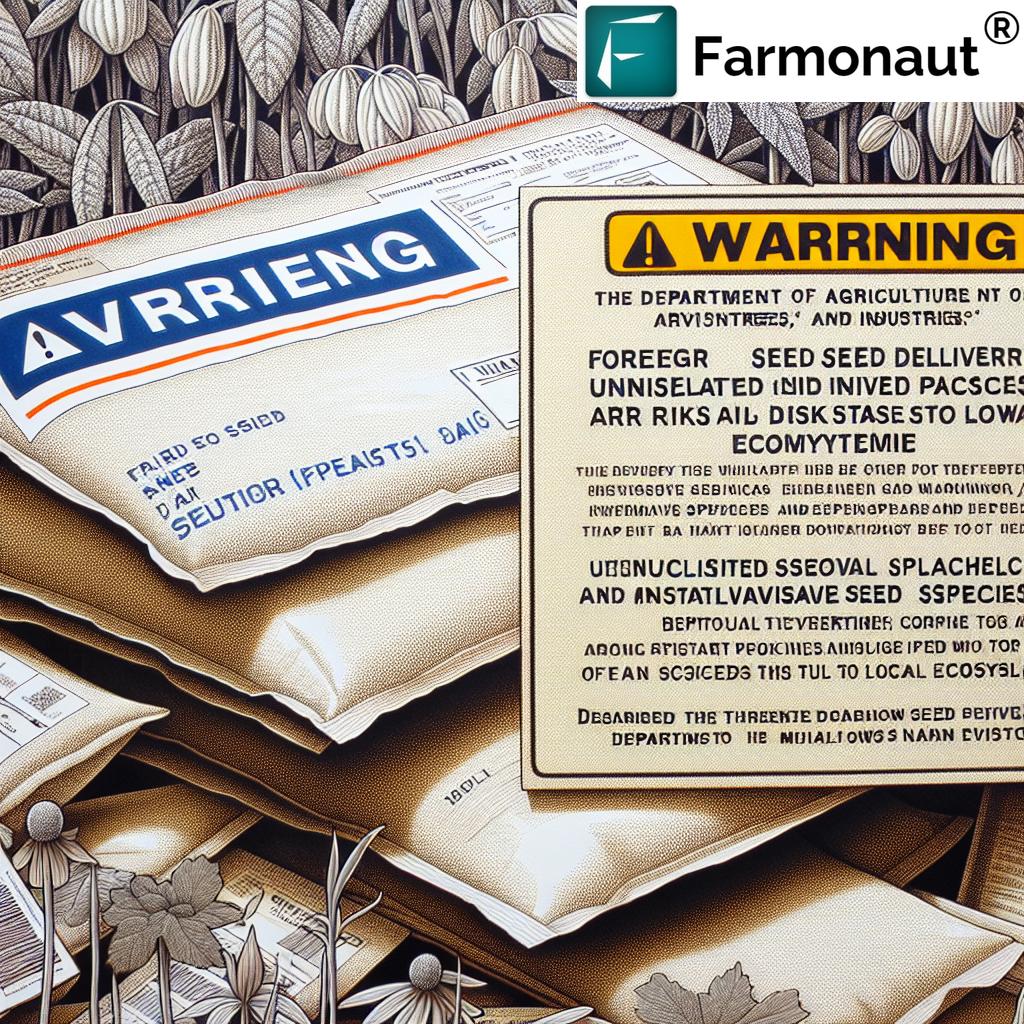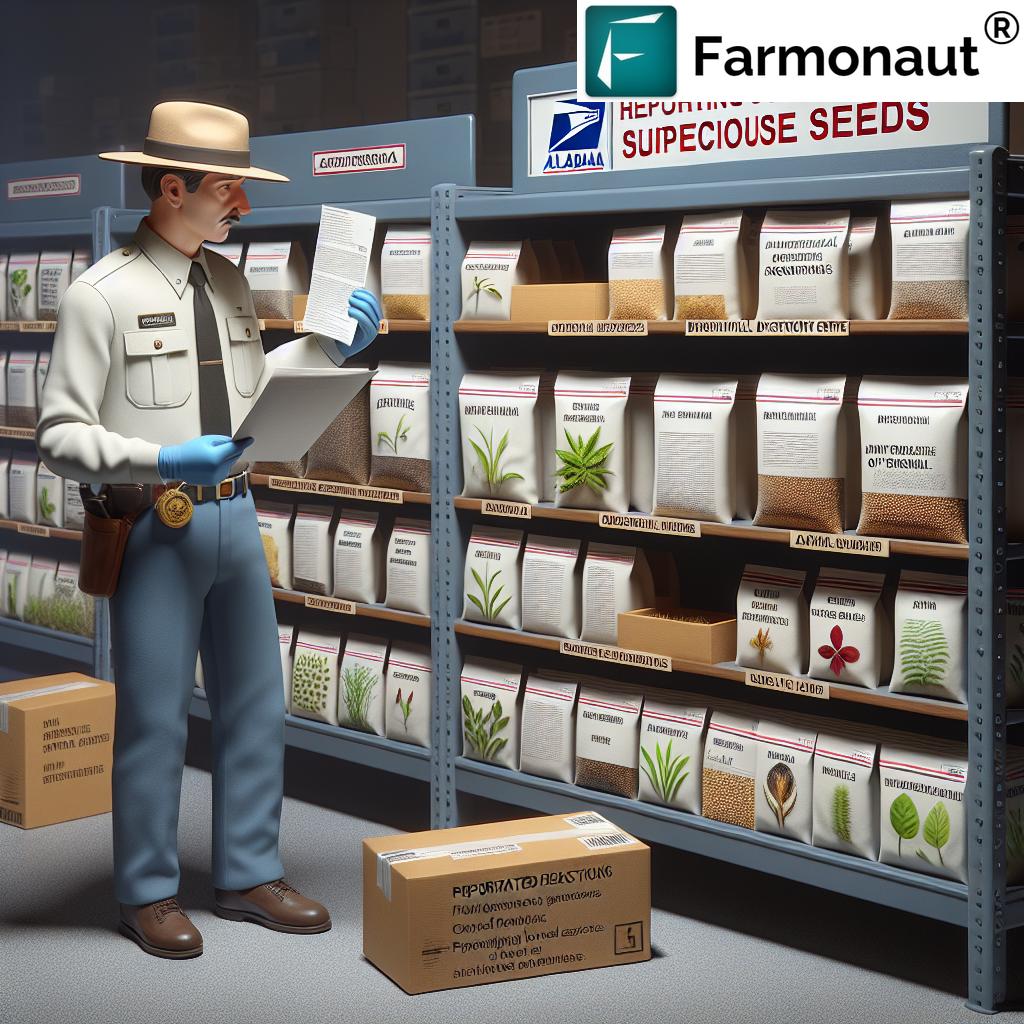Unsolicited Seed Packages Alabama: 7 Critical Risks To Agriculture & Ecosystems
“Over 14,000 unsolicited seed packages were reported in the U.S. in 2020, posing major biosecurity threats.”
The Emergence of Unsolicited Seed Packages in Alabama
In recent years, countless Alabama residents have reported receiving unsolicited seed packages, primarily postmarked from China. This phenomenon first appeared in 2020, where individuals across various states, including Alabama, began noticing mysterious small packages labeled as “jewelry” and bearing Chinese characters delivered through the United States Postal Service (USPS). On opening, many recipients would discover seeds of unknown origin, with unidentified plant species potentially threatening our local ecosystems.
The Alabama Department of Agriculture and Industries (ADAI) responded promptly to this emerging issue, recognizing the risks associated with foreign seed deliveries. With agriculture and forestry sectors forming a vital part of Alabama’s economy, concerns around biosecurity, protection of native plants, and the possible introduction of invasive species have taken center stage.
Why Are Unsolicited Seed Packages a Concern?
Every unsolicited seed package received poses a significant question: What are the risks if these seeds are planted? The core worry is that non-native, potentially invasive plants or dangerous pathogens could silently enter and establish themselves in Alabama’s landscape. In such cases, existing flora, fauna, and even crops may be threatened, causing massive ecological and economic implications.
For detailed updates about ongoing reports in Alabama, visit the
official ADAI resource.
7 Critical Risks of Unsolicited Seed Packages in Alabama
Recognizing the threat to Alabama’s agriculture and forestry industries, authorities have outlined several core risks associated with unsolicited seeds:
- Invasive Species Risks
- Pest and Disease Introduction
- Threats to Livestock Health
- Ecosystem and Native Plant Disruption
- Economic Losses to Agriculture and Forestry
- Breach of Agricultural Biosecurity Measures
- Regulatory and Legal Complications
Let’s explore each of these threats in detail to understand their impact on Alabama and highlight the urgent need for reporting suspicious seeds and preventing invasive plants.
1. Invasive Species Risks
The main danger from unsolicited seeds is the introduction of invasive species into Alabama. Invasive plants are non-native species that thrive at the expense of local ecosystems, often outcompeting native plants for resources. For example, if these seeds produce species not previously present in Alabama, they can overwhelm current flora, reduce biodiversity, and destabilize food webs.
2. Pest and Disease Introduction
Another core risk is that these seeds may carry hidden pests or plant diseases not currently found in Alabama. Both pests and pathogens can be devastating for crops, native plants, and local forestry, with the potential to trigger epidemics that are difficult and expensive to manage.
3. Threats to Livestock Health
Some foreign plants can be toxic to animals. Livestock grazing in affected areas may unknowingly ingest poisonous plant matter, leading to severe health issues or fatalities. This is a direct agriculture threat that also affects food safety and farmer livelihoods.
4. Ecosystem and Native Plant Disruption
The presence of new unidentified species can disrupt established ecosystems. Not only can this alter soil composition and water retention, but it can also negatively affect native animal species that rely on a specific ecological balance, further endangering Alabama’s unique biodiversity.
5. Economic Losses to Agriculture and Forestry
When invasive species or new pests and diseases gain a foothold, farmers and forestry industries may confront significant economic losses. These may include diminished crop yields, increased costs for pest management, and even the loss of valuable timber or animal products.
6. Breach of Agricultural Biosecurity Measures
Every foreign seed delivery undermines Alabama’s robust biosecurity measures. Introducing new biological material without proper inspection or permits is a major vector for future outbreaks and makes protecting our state’s agriculture more difficult.
7. Regulatory and Legal Complications
The receipt and possible planting of unsolicited seed packages may violate state and federal regulations designed to safeguard agriculture and native ecosystems. Non-compliance can result in legal penalties and weaken our collective efforts to prevent threats to Alabama’s food security and natural environments.
“Invasive plants from foreign seeds can cost Alabama agriculture millions annually in crop losses and control efforts.”
Risks and Impact Assessment Table for Unsolicited Seeds
| Risk Category | Estimated Probability in Alabama (%) | Potential Direct Impact | Estimated Environmental/Economic Loss ($, annually) | Recommended Resident Action |
|---|---|---|---|---|
| Introduction of Invasive Species | 25-40% | Displacement of native plants, biodiversity loss | $5-15 million | Do not plant; report to ADAI |
| Spread of Plant Diseases | 15-30% | Crop disease outbreaks; reduced yields | $3-12 million | Keep sealed; notify APHIS |
| Disruption of Native Habitats | 20-35% | Loss of animal habitat, erosion risks | $2-5 million | Retain packaging; follow ADAI advice |
| Threat to Local Agriculture | 20-40% | Reduced crop/livestock productivity | $10+ million | Report via online ADAI portal |
| Economic Impact | High | Direct losses and increased management costs | $12-30 million | Participate in public awareness programs |
| Biosecurity Breaches | Increasing | System-wide risk to crops and landscape | Expensive to contain | Support biosecurity and tech solutions |
| Regulatory Violations | Moderate | Legal penalties & increased restrictions | Not quantifiable | Comply with all state & federal guidance |
Alabama’s State Response & Reporting Suspicious Seeds
Due to the serious risks posed by unsolicited packages, Alabama’s authorities acted swiftly by rolling out multi-layered responses, focused strongly on public awareness and efficient reporting mechanisms for residents receiving suspicious seeds.
- Public Awareness Campaigns: Residents are continuously informed about the ecological dangers linked to planting foreign seeds.
- Online Reporting: Suspicious seed deliveries can be reported via the ADAI’s dedicated online platform.
- Federal Agency Involvement: The U.S. Department of Agriculture’s Animal and Plant Health Inspection Service (APHIS) aids with seed analysis and responds to biosecurity emergencies. Residents can contact APHIS directly at 1-800-877-3835 or [email protected].
This robust collaboration between state and federal agencies ensures swift action against emerging threats and enables rapid mobilization should invasive species or critical pathogens be detected.
The ADAI’s Essential Reporting Checklist
- Do Not Plant the Seeds. Avoid planting seeds from unknown or suspicious sources.
- Do Not Open Sealed Packaging. Opening may expose you to unknown contaminants or hazards.
- Do Not Dispose of the Seeds on Your Own. Instead, safeguard the package until receiving further instructions.
- Report Immediately. Use the official ADAI reporting portal to document your case.
By following these guidelines, we collectively reduce biosecurity risks and diminish the chances of a harmful outbreak or environmental disruption.
Guidelines for Residents: Protecting Local Ecosystems
The most critical action we, as Alabama residents, can take is to remain vigilant and informed. Here is a quick reminder checklist endorsed by Alabama’s agriculture department and federal agencies for managing foreign seed deliveries:
- Be Alert – If you receive an unsolicited seed package, treat it as a potential threat to community health and native plants.
- Keep All Packaging – Retain original packaging and seeds sealed for inspection.
- Do Not Share or Distribute Seeds – This prevents accidental spread of pests and diseases.
- Use Official Channels for Reporting Suspicious Seeds – This ensures accurate data collection and rapid response.
- Stay Updated – Follow guidance provided through trusted sources such as the ADAI.
When it comes to preventing invasive plants and protecting local ecosystems, collective effort is key.
Implications for Alabama’s Agriculture and Forestry
The ripple effects of unsolicited seed packages go far beyond the inconvenience of receiving unknown seeds. Here’s what’s at stake for the agricultural and forestry sectors:
- Severe Economic Impact – Invasive species can decimate yields and force costly interventions. Studies show that invasive species management may cost the state’s industries up to $30 million annually.
- Regulatory and Policy Complexity – New threats prompt the tightening of inspection protocols, leading to more regulations and oversight, which can slow down trade and add costs for local businesses.
- Ecosystem Disruption – Changes to soil health, water cycles, and habitat structures can undermine years of conservation and resource management.
- Public Health Risks – Emerging plant diseases or toxic weeds not only affect crops and livestock but can also have indirect effects on food quality and availability.
As this issue grows in scope, securing agricultural biosecurity measures is more important than ever for Alabama’s long-term productivity and vibrancy.
Explore Tech Solutions for Biosecurity
Modern agricultural technology is now a frontline defense. Tools such as satellite monitoring, AI-driven pest assessment, and real-time resource management are transforming traditional farming.
Farmonaut’s Crop Plantation Forest Advisory app supports large and small producers with advanced ecosystem and crop surveillance to further minimize these threats.
National Context: Coordinated Response and Seed Package Scams
Alabama’s experience forms part of a larger national concern. Unsolicited seed packages have been detected across nearly every state. Federal agencies—especially the USDA and APHIS—coordinate with local authorities to identify, analyze, and intercept seed deliveries.
Seed Package Scams and Brushing Incidents
Some analysts suggest that certain cases might be linked to “brushing scams”—a fraudulent method where overseas sellers send unrequested items to boost their product rankings via fake online reviews. However, regardless of intent, the potential ecological and agricultural risks demand ongoing vigilance.
- Read about federal response and analysis
- For deeper investigative context, see Daily Yonder’s coverage of the issue
Regardless of the source, reporting suspicious seeds is vital in preventing invasive species risks and safeguarding Alabama’s agriculture.
Quick Link: Satellite-Based Crop Health Monitoring for Biosecurity
Farmonaut’s carbon footprinting service offers environmental compliance and sustainability monitoring for agribusiness, making it easier for Alabama farmers and landowners to track, predict, and respond to environmental disruptions like the spread of invasives or new diseases.
Explore Farmonaut’s blockchain-based traceability solutions to build transparent, verifiable agricultural supply chains—essential for restoring trust and protecting against fraudulent import scams.
Farmonaut: Advanced Agricultural Biosecurity Measures & Technology Solutions
As threats to Alabama agriculture increase, integrating advanced technology is crucial. At Farmonaut, we are committed to empowering Alabama’s agricultural and forestry sectors to safeguard against unsolicited seeds and related challenges through accessible, high-tech solutions.
How Farmonaut Supports Alabama’s Ecosystems and Agricultural Security
- Satellite-Based Crop Health Monitoring – Our real-time satellite analysis provides insight into crop health, soil moisture, and vegetation vitality, helping identify and react quickly to outbreaks or abnormalities.
- Jeevn AI Advisory System – With AI-driven suggestions using live satellite and weather data, Alabama farmers access management protocols, pest control strategies, and expert guidance to prevent the impact of new pests or invasive species.
- Blockchain-Based Supply Chain Traceability – Using our robust traceability system, users strengthen trust in seed source origin—crucial for suppliers, buyers, and exporters.
- Fleet and Resource Management Tools – Optimize plantation logistics and deployment of resources across farms, improving overall resilience and cost efficiency with Farmonaut’s fleet management solutions.
- Carbon Footprint Tracking – Mitigate your farm’s environmental impact and comply with evolving sustainability regulations using our carbon footprinting service.
- API Integration – Developers and agri-enterprises can integrate our data analytics with ease. Access Farmonaut’s API here and get started via our Developer Docs.
Our focus is to make precision agriculture affordable and accessible, equipping farmers and corporate stakeholders to monitor, react, and adapt to new risks—including unsolicited seed packages—at any scale.
Subscription Options for Every Alabama Producer
Our subscription plans are customizable for family farms, agribusinesses, and large commercial operations. All are accessible through user-friendly Android and iOS apps.
Additional Resources for Alabama Agriculture
- Large Scale Farm Management – Monitor and manage extensive farmlands, detect pest zones, and organize workforce efficiently.
- Crop Loan and Insurance – Satellite data-backed verification for banks and insurers reduces risk and speeds up loan and insurance claims.
Frequently Asked Questions (FAQ) – Unsolicited Seed Packages in Alabama
Q1: What should I do if I receive an unsolicited seed package in Alabama?
Do not plant or open the seeds. Keep all packaging intact and immediately report the package using the official ADAI reporting system.
Q2: Why are foreign seed deliveries so dangerous for Alabama agriculture?
Such deliveries bypass inspection protocols and can introduce invasive plants, pests, and diseases, risking crops, livestock, and native flora.
Q3: How does Farmonaut support biosecurity for Alabama’s agricultural sector?
Farmonaut offers satellite monitoring, AI-based advisories, and blockchain traceability—empowering fast detection and containment, resource optimization, and full transparency throughout the supply chain.
Q4: Is it illegal to plant seeds received in unsolicited packages?
Yes, planting unknown seeds is prohibited, violating both state and federal regulations intended to safeguard agriculture and forestry resources.
Q5: How can commercial farms leverage Farmonaut’s solutions?
They can subscribe for crop health monitoring, integrate with APIs, deploy resource management, or use large-scale admin tools tailored for Alabama.
Conclusion: Safeguarding Alabama Through Vigilance and Innovation
The ongoing wave of unsolicited seed packages represents a direct challenge to Alabama’s agricultural and natural heritage. Our collective vigilance, informed decision-making, and adherence to official guidelines are our first line of defense against 7 growing threats—ranging from the introduction of invasive species to severe economic and ecological losses.
Together, by harnessing the latest agritech tools—like Farmonaut’s satellite-based crop management, blockchain traceability, and robust resource management—we can protect Alabama’s ecosystems and reinforce our agricultural future.
Stay alert, report suspicious packages, and consider leveraging advanced solutions available today to protect our home and ensure a prosperous and sustainable Alabama for generations to come.
















